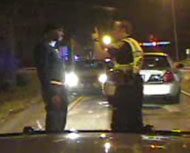9/5/2012
Tennessee: Improper to Arrest Someone for Passing DUI TestTennessee Appeals Court says police cannot arrest someone who passes sobriety tests for drunk driving.

A Tennessee motorist who passed six roadside sobriety tests should not have been arrested for driving under the influence of alcohol (DUI), the state Court of Criminal Appeals ruled Friday. The three-judge panel rejected the attempt by prosecutors to overturn a trial court's finding that David D. Bell should not have been taken into custody on May 13, 2009, after he displayed "excellent" mental acuity after being pulled over by a county sheriff's deputy.
Bell had made a wrong turn in a construction area, briefly driving on the wrong side of the road -- a mistake that a number of other confused drivers had made that day. Sevierville Police Officer Timothy Russell, who had extensive DUI training, arrived on the scene to take over from the deputy. Russell asked Bell to perform a four-finger count; say the alphabet from the letter G to S; identify the year of his fifth, sixth or seventh birthday; perform a one-legged stand while counting to thirty; and do a nine-step walk-and-turn. On the stand, Officer Russell testified that his mental performance was excellent, but that Bell "did not plant and turn as I had instructed him to." So Russell placed Bell under arrest.
Officer Russell admitted he did not follow proper procedure by turning off his flashing blue lights, which is a known source of distraction for the plant-and-turn test. After reviewing dashcam video from that night, the trial judge rejected Officer Russell's conclusion.
"I honestly think that he did pretty dog-gone good on the field sobriety tests, better than most I've seen," Sevier County Circuit Court Judge Rex Henry Ogle observed. "I couldn't pass them as well as he did."
Judge Ogle found the initial traffic stop legitimate but granted a suppression motion because the arrest went too far. The three-judge appellate panel also reviewed the videotape and sided with the trial judge. The appeals court found ample reason to suspect Bell might have been intoxicated, but the probable cause evaporated after testing.
"We interpret the slightly more colorful comments made by the trial court in its ruling from the bench on the defendant's suppression motion as a finding, as a factual matter, that the defendant passed all of the field sobriety tests that he was given," Judge John Everett Williams wrote for the three-judge panel. "The state is not required to perform field sobriety tests on an individual prior to arresting him or her for driving under the influence. However, if the state chooses to administer such tests, it may not simply disregard the results if the individual involved performs them successfully. Had the defendant failed any of the field sobriety tests, we have no doubt that the state would have argued that the defendant's failure provided strong evidence in support of probable cause. We believe that the defendant's consistent success on a battery of such tests is likewise compelling evidence -- in the other direction."
A copy of the decision is available in an 85k PDF file at the source link below.


